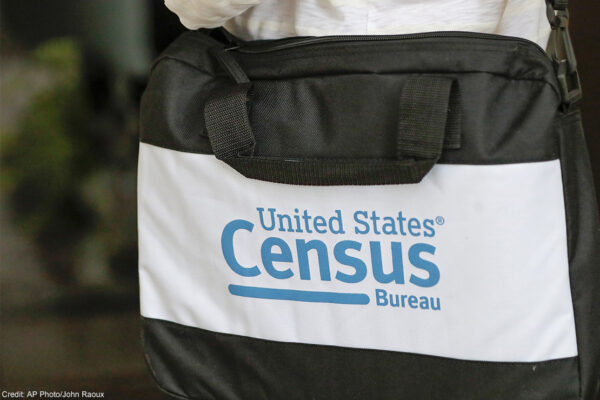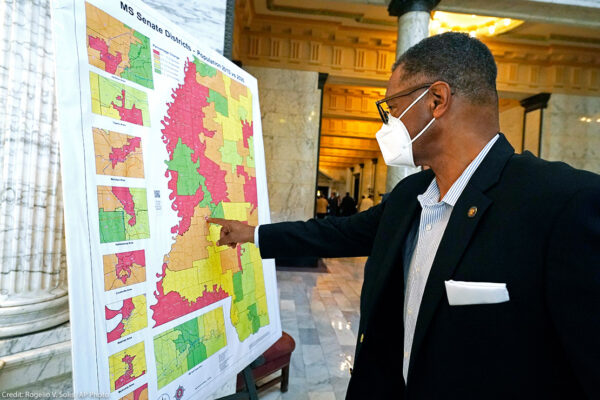Supreme Court Term 2025-2026
We’re breaking down the cases we've asked the court to consider this term.
Latest Case Updates
Ongoing
Updated January 26, 2026
Ongoing
Updated January 16, 2026
Ongoing
Updated January 16, 2026
Ongoing
Updated January 9, 2026
Featured
Missouri
Feb 2026

Voting Rights
Missouri v. U.S. Department of Commerce
A coalition of civil rights and immigrant-rights organizations has moved to intervene as defendants in a lawsuit that threatens to dismantle the Constitution‚Äôs long-standing requirement that the decennial census count all people living in the United States. Missouri asks the court to exclude undocumented immigrants and people living in the country on temporary visas from the census count used to determine congressional representation‚ÄĒan unprecedented move that would upend more than two centuries of constitutional practice.
Mississippi
Dec 2025

Voting Rights
White v. Mississippi State Board of Elections
District lines used to elect Mississippi’s Supreme Court have gone unchanged for more than 35 years. We’re suing because the current lines crack the Mississippi Delta and dilute the voting strength of Black Mississippians in state Supreme Court elections, in violation of the Voting Rights Act.
Court Case
Dec 2025

National Security
Human Rights
FOIA Case Seeking the Trump Administration’s Legal Justification for Deadly Boat Strikes
The Department of Justice‚Äôs Office of Legal Counsel (‚ÄúOLC‚ÄĚ) authored a legal opinion that reportedly claims to justify the Trump administration‚Äôs illegal lethal strikes on civilians in boats in the Caribbean Sea and eastern Pacific Ocean. Media reports indicate that, in addition to claiming that the strikes are lawful acts in an alleged ‚Äúarmed conflict‚ÄĚ with unspecified drug cartels, the OLC opinion also purports to immunize personnel who authorized or took part in the strikes from future criminal prosecution. Because the public deserves to know how our government is justifying these illegal strikes, and why they think the people who carried them out should not be held accountable, the ļž–” ”∆Ķ is seeking immediate release of the OLC legal opinion and related documents pursuant to the Freedom of Information Act.
U.S. Supreme Court
Dec 2025

Immigrants' Rights
Barbara v. Donald J. Trump
President Trump is attempting to undermine the promise of birthright citizenship to children born on U.S. soil. But the ļž–” ”∆Ķ and partners are fighting to protect the rights of citizens that are plainly stated in the Constitution, federal statute, and reaffirmed by the Supreme Court for more than a century. We‚Äôre arguing against the Trump administration in the Supreme Court and are confident we will win.
U.S. Supreme Court
Nov 2025

Voting Rights
Racial Justice
Allen v. Milligan
Whether Alabama’s congressional districts violate Section 2 of the Voting Rights Act because they discriminate against Black voters. We succeeded in winning a new map for 2024 elections which, for the first time, has two congressional district that provide Black voters a fair opportunity to elect candidates of their choosing despite multiple attempts by Alabama to stop us at the Supreme Court. Despite this win, Alabama is still defending its discriminatory map, and a trial was held in February 2025 to determine the map for the rest of the decade.
In May 2025, a federal court ruled that Alabama's 2023 congressional map both violates Section 2 of the Voting Rights Act and was enacted by the Alabama Legislature with racially discriminatory intent.
Washington, D.C.
Oct 2025

Voting Rights
League of Women Voters Education Fund v. Trump
On March 25, 2025, in a sweeping and unprecedented Executive Order, President Trump attempted to usurp the power to regulate federal elections from Congress and the States. Among other things, the Executive Order directs the Election Assistance Commission‚ÄĒan agency that Congress specifically established to be bipartisan and independent‚ÄĒto require voters to show a passport or other citizenship documentation in order to register to vote in federal elections. If implemented, the Executive Order would threaten the ability of millions of eligible Americans to register and vote and upend the administration of federal elections.
On behalf of leading voter registration organizations and advocacy organizations, the ļž–” ”∆Ķ and co-counsel filed a lawsuit to block the Executive Order as an unconstitutional power grab.
U.S. Supreme Court
Oct 2025

Voting Rights
State Board of Election Commissioners v. Mississippi State Conference of the NAACP
Mississippi has a growing Black population, which is already the largest Black population percentage of any state in the country. Yet. Black Mississippians continue to be significantly under-represented in the state legislature, as Mississippi’s latest districting maps fail to reflect the reality of the state’s changing demographics. During the 2022 redistricting process, the Mississippi legislature refused to create any new districts where Black voters have a chance to elect their preferred representative. The current district lines therefore dilute the voting power of Black Mississippians and continue to deprive them of political representation that is responsive to their needs and concerns, including severe disparities in education and healthcare.
U.S. Supreme Court
Oct 2025

Voting Rights
Louisiana v. Callais (Callais v. Landry)
Whether the congressional map Louisiana adopted to cure a Voting Rights Act violation in Robinson v. Ardoin is itself unlawful as a gerrymander.
Missouri
Sep 2025

Voting Rights
Wise v. Missouri
In unprecedented fashion, the State of Missouri has redrawn the district lines used for electing members of Congress for a second time this decade. These new district lines are gerrymandered and will harm political representation for all Missourians, particularly Black residents in Kansas City, who have been divided along racial lines.
All Cases
1,675 Court Cases

U.S. Supreme Court
Jul 2025
National Security
+2 Issues
TikTok Inc., et al. v. Garland (Amicus)
The Supreme Court will decide whether a law that effectively bans TikTok in the United States violates the First Amendment rights of more than 170 million Americans who use the social media platform. The law also allows the President to ban other foreign-owned apps deemed a national security threat, opening the door to future abuse and censorship. The ban on TikTok is set to go into effect on January 19, 2025.
Explore case
U.S. Supreme Court
Jul 2025

National Security
+2 Issues
TikTok Inc., et al. v. Garland (Amicus)
The Supreme Court will decide whether a law that effectively bans TikTok in the United States violates the First Amendment rights of more than 170 million Americans who use the social media platform. The law also allows the President to ban other foreign-owned apps deemed a national security threat, opening the door to future abuse and censorship. The ban on TikTok is set to go into effect on January 19, 2025.

Court Case
Jul 2025
Immigrants' Rights
Nyynkpao Banyee v. Pamela Bondi, et al
Explore case
Court Case
Jul 2025

Immigrants' Rights
Nyynkpao Banyee v. Pamela Bondi, et al

Minnesota Supreme Court
Jul 2025
Free Speech
Energy Transfer LP v. Greenpeace International, Unicorn Riot
This case in the Minnesota Supreme Court asks whether the MFFIA's protections apply to newsgatherers even if they are alleged to have engaged in trespassing while newsgathering. The ļž–” ”∆Ķ‚Äôs State Supreme Court Initiative, alongside the ļž–” ”∆Ķ of Minnesota and law firm Biersdorf & Associations, filed a brief representing Unicorn Riot, a media organization that covered protests of the Dakota Access Pipeline. The brief argues that MFFIA and constitutional reporter‚Äôs privileges, under both the U.S. and Minnesota constitutions, protect Unicorn Riot from having to comply with Energy Transfer‚Äôs subpoenas.
Explore case
Minnesota Supreme Court
Jul 2025

Free Speech
Energy Transfer LP v. Greenpeace International, Unicorn Riot
This case in the Minnesota Supreme Court asks whether the MFFIA's protections apply to newsgatherers even if they are alleged to have engaged in trespassing while newsgathering. The ļž–” ”∆Ķ‚Äôs State Supreme Court Initiative, alongside the ļž–” ”∆Ķ of Minnesota and law firm Biersdorf & Associations, filed a brief representing Unicorn Riot, a media organization that covered protests of the Dakota Access Pipeline. The brief argues that MFFIA and constitutional reporter‚Äôs privileges, under both the U.S. and Minnesota constitutions, protect Unicorn Riot from having to comply with Energy Transfer‚Äôs subpoenas.

Florida
Jul 2025
Immigrants' Rights
FLORIDA IMMIGRANT COALITION v. UTHMEIER
The ļž–” ”∆Ķ of Florida, ļž–” ”∆Ķ Immigrants‚Äô Rights Project, Americans for Immigrant Justice, and the Community Justice Project filed a federal class action lawsuit challenging Florida‚Äôs new extreme anti-immigrant law, Senate Bill 4C (SB 4C), which authorizes state and local law enforcement to imprison people based on their manner of entering the country ‚ÄĒ powers the Constitution reserves exclusively to the federal government.
Explore case
Florida
Jul 2025

Immigrants' Rights
FLORIDA IMMIGRANT COALITION v. UTHMEIER
The ļž–” ”∆Ķ of Florida, ļž–” ”∆Ķ Immigrants‚Äô Rights Project, Americans for Immigrant Justice, and the Community Justice Project filed a federal class action lawsuit challenging Florida‚Äôs new extreme anti-immigrant law, Senate Bill 4C (SB 4C), which authorizes state and local law enforcement to imprison people based on their manner of entering the country ‚ÄĒ powers the Constitution reserves exclusively to the federal government.

Ohio
Jul 2025
Reproductive Freedom
Planned Parenthood Southwest Ohio Region et al., v. Ohio Department of Health, et al.
The ļž–” ”∆Ķ, the ļž–” ”∆Ķ of Ohio, Planned Parenthood Federation of America, the law firm WilmerHale, and Fanon Rucker of the Cochran Law Firm, on behalf of Planned Parenthood Southwest Ohio Region, Planned Parenthood of Greater Ohio, Preterm-Cleveland, Women‚Äôs Med Group Professional Corporation, Dr. Sharon Liner, and Julia Quinn, MSN, BSN, amended a complaint in an existing lawsuit against a ban on telehealth medication abortion services to bring new claims under the Ohio Reproductive Freedom Amendment, including additional challenges to other laws in Ohio that restrict access to medication abortion in the state.
Explore case
Ohio
Jul 2025

Reproductive Freedom
Planned Parenthood Southwest Ohio Region et al., v. Ohio Department of Health, et al.
The ļž–” ”∆Ķ, the ļž–” ”∆Ķ of Ohio, Planned Parenthood Federation of America, the law firm WilmerHale, and Fanon Rucker of the Cochran Law Firm, on behalf of Planned Parenthood Southwest Ohio Region, Planned Parenthood of Greater Ohio, Preterm-Cleveland, Women‚Äôs Med Group Professional Corporation, Dr. Sharon Liner, and Julia Quinn, MSN, BSN, amended a complaint in an existing lawsuit against a ban on telehealth medication abortion services to bring new claims under the Ohio Reproductive Freedom Amendment, including additional challenges to other laws in Ohio that restrict access to medication abortion in the state.
